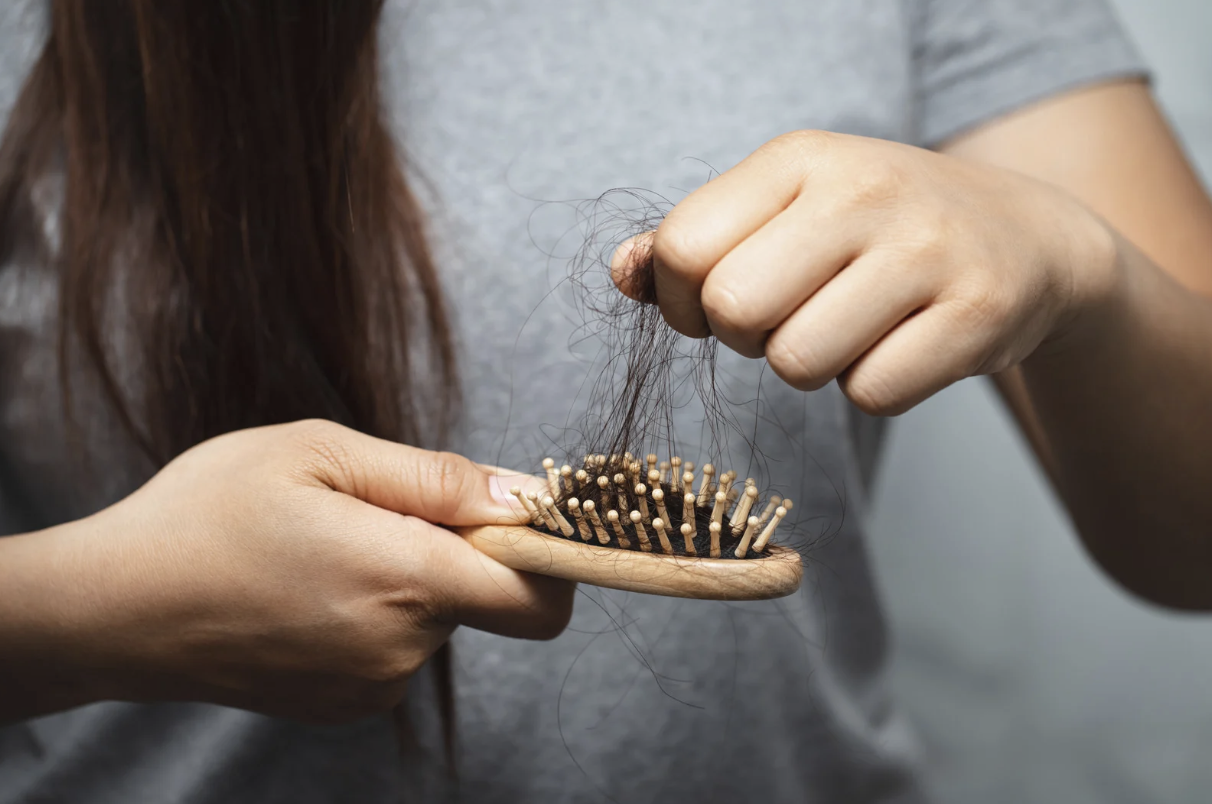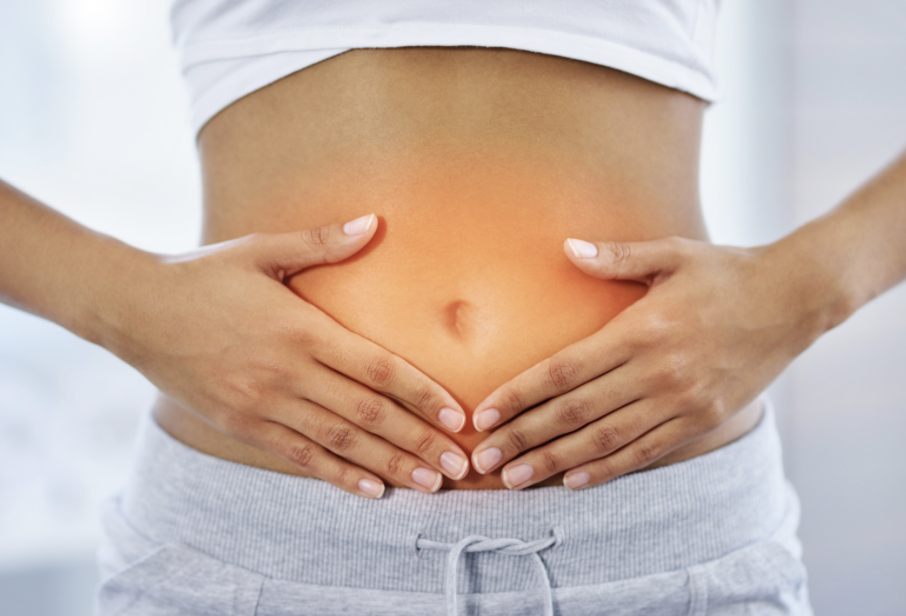
Why Am I Losing My Hair in Perimenopause?
Hair loss during perimenopause is incredibly common, but that doesn’t make it any less frustrating or emotional. For many women, it can feel like one more thing their body is doing without their permission. The good news? You’re not stuck with it forever. Once you understand why it’s happening and what your hair needs during this transition, there’s a lot you can do to support regrowth, slow shedding, and rebuild confidence—strand by strand.

Why Am I Always Hot? Understanding Hot Flashes, Night Sweats, and the Vasomotor Symptoms of Perimenopause
Most women are familiar with the term "hot flash," but many don't realize this is just one part of a broader picture. Vasomotor symptoms can also include night sweats, sudden feelings of anxiety, flushing, and even heart palpitations. These intense and often unpredictable moments are classic symptoms of vasomotor instability, a hallmark of perimenopause.

Why Blood Sugar Balance Is the Secret to Feeling Better in Perimenopause
If you're in perimenopause and feel like your body is working against you—think stubborn belly fat, mood swings, brain fog, and energy crashes—blood sugar might be the missing piece you haven't considered. When blood sugar rises, your body releases a hormone called insulin to help shuttle that sugar out of your blood and into your cells. When everything is working smoothly, your energy stays stable, your cravings are manageable, and your hormones stay more balanced. But when blood sugar is constantly spiking and crashing (from processed foods, skipping meals, stress, poor sleep), your body is continually stressed—and your hormones suffer.

Perimenopause and Sleep Issues: Why Midlife Sleep Feels Impossible
If you're like me, you probably have woken up drenched in sweat, gasping for breath, and staring at the ceiling. Welcome to the nightly battle many women face as their bodies struggle with perimenopause. Perimenopause typically occurs in your 40s (but can start in your 30s and last well into your 50s) and brings hormonal changes that can make sleep feel impossible. You're not alone if you've been tossing and turning, waking up multiple times a night, or struggling with daytime fatigue. Studies suggest up to 85% of women in perimenopause experience some form of sleep disturbance.

The Best Foods to Heal Perimenopausal Skin
Perimenopause brings many changes, and your skin is no exception. As estrogen levels fluctuate and gradually decline, your skin may become drier, thinner, and more prone to wrinkles. Collagen production slows, hydration decreases, and skin cell turnover isn't as efficient as it once was. This hormonal shift can also lead to increased sensitivity, breakouts, or even unexpected changes in pigmentation. While these changes can feel frustrating, the good news is that the right nutrition can make a significant difference in maintaining a radiant, resilient complexion.

Brain Fog in Perimenopause: Why It Happens and How to Clear the Mental Haze
Do you ever walk into a room and completely forget why you're there? Or struggle to find the right word mid-sentence? If so, you're not alone. Brain fog is one of the most common and frustrating symptoms of perimenopause. Brain fog during perimenopause is largely driven by hormonal fluctuations, particularly declining estrogen. Estrogen plays a major role in brain function, including memory, focus, and overall cognitive performance. As levels drop, it can impact neurotransmitter activity, leading to forgetfulness, trouble concentrating, and that frustrating "mental haze."

Vaginal Health in Perimenopause: What You Need to Know
As estrogen levels decline during perimenopause, many women notice changes in their vaginal and urinary health that can affect comfort, intimacy, and overall well-being. These changes are part of what’s known as Genitourinary Syndrome of Menopause (GSM)—a condition that impacts both the vagina and urinary tract. Now, let's be honest here, there are no good perimenopause symptoms. However, the ones that affect your genitals and urinary tract are particularly difficult to manage. Understanding what’s happening and what you can do about it can significantly affect how you feel.

Perimenopause and Facial Hair: Why? Just Why?
As estrogen levels drop, testosterone remains steady, becoming more dominant. This hormonal imbalance can stimulate the growth of terminal hairs—thicker, coarser, and darker hairs—on areas like the chin, upper lip, and jawline. The softer, finer “peach fuzz” associated with estrogen may thin out or stop growing, leaving areas like the face and arms with less hair coverage. Testosterone influences certain areas more than others, leading to noticeable facial hair while hair in other areas, like the underarms or legs, may grow more slowly.

Why I Love Dry January: Alcohol and Perimenopause
Kicking off the new year with Dry January is a fantastic way to hit a reset, especially during perimenopause—when our bodies are already dealing with hormonal changes. While alcohol might feel like an easy and familiar way to unwind, it can actually stir up a whole lot of trouble. Skipping booze once in a while can be a game-changer for women in perimenopause. Drinking during perimenopause is like adding fuel to an already roaring fire. Here are a few ways that alcohol causes chaos: disrupted sleep, increased hot flashes and night sweats, mood swings and anxiety, spiked blood sugar, and slowed metabolism.

Harnessing Your Qi: A New Year's Guide to Energy, Balance, and Well-Being for Perimenopausal Women
A new year usually means New Year's resolutions for many of us. Whether we stick to them or not is a whole other story! Health and wellness goals are some of the most common, and for women in perimenopause, these goals take on even greater significance. Perimenopause brings fluctuating energy levels, heightened stress, and challenges to emotional and physical balance. By focusing on practices that nurture your Qi, or life force energy, you can recharge your internal battery, reduce perimenopause symptoms, and encourage balance in your mind and body.

The Gut-Brain Connection: Why Gut Health Is Crucial During Perimenopause
If you've noticed mood swings, brain fog, disrupted sleep, or heightened anxiety during perimenopause, your gut health might be partly to blame. Many of us think gut health is solely about digestion, but it plays a vital role in our overall well-being—especially during perimenopause. Your gut, often called your "second brain," is intricately connected to hormonal health. It produces many neurotransmitters—like serotonin and dopamine—influencing mood, energy, and sleep. As hormones fluctuate in perimenopause, the balance of your gut microbiome and the production of these critical chemicals can be disrupted, amplifying physical and emotional symptoms.

The Lesser-Known Symptoms of Perimenopause
If you're navigating the journey of perimenopause, you're likely familiar with the well-known symptoms: hot flashes, brain fog, fatigue, anxiety, and weight gain. These hallmark signs are often expected and widely discussed. However, perimenopause encompasses far more than these symptoms, and many women may experience less common signs that can feel puzzling or even concerning. Because estrogen receptors are located throughout our bodies, hormone fluctuations during this phase can affect many different systems—sometimes in surprising ways.

What to Know About Heart Palpitations During Perimenopause
Heart palpitations are the sensation that your heart is racing, pounding, or fluttering. You may feel them in your chest, neck, or throat; while they can be alarming, they're typically harmless. During perimenopause and menopause, hormonal fluctuations—especially in estrogen and progesterone—can affect the autonomic nervous system, which controls heart rate and rhythm. These hormone shifts often lead to palpitations, making them a common perimenopause symptom.

Get Your Glow: The Benefits of Gua Sha and Facial Massage for Women Over 40
Embracing the aging process is essential, but when it comes to my face, I'm not giving up without a fight. Daily Gua Sha and facial massage are my secret weapons. Gua Sha focuses on lymphatic drainage, circulation, and rejuvenation. By promoting the movement of lymph fluid, it aids in detoxification and reducing puffiness. Gua Sha enhances health and beauty, particularly for women over 40 by helping lift and define facial contours, offering a sculpted and refreshed appearance.

Perimenopause Weight Loss: Forget Calories and Focus on Macros!
Protein, fat, and carbohydrates are the three macronutrients your body needs to function, and are required in larger quantities, hence the name "macro" nutrients. These three macronutrients help our bodies to function optimally, support metabolism, and keep us feeling our best. They are essential to understand when it comes to perimenopausal weight loss.

Why Maca is my Favorite Perimenopause Supplement
I'm finally spilling the tea on my secret perimenopause weapon—Maca. This supplement has changed my entire perimenopause experience. The fascinating thing about Maca is that it helps to naturally increase hormone levels, alleviating numerous symptoms instead of targeting just one or two.

Let’s Talk Skincare During Perimenopause!
Changes in our skin are a natural part of aging, and the hormonal changes we go through in our 40s as we enter perimenopause can significantly impact the texture and appearance of our skin. While most women associate skin aging with the natural aging process, the hormonal changes during perimenopause often amplify these effects, sometimes making women feel as though they've aged drastically in a short period.

The Relationship Between Gut Health and Perimenopause Symptoms
Many women don't realize that gut health has a critical role in managing perimenopause symptoms and can provide a potential pathway to relief. The gut is our "second brain" and is a complex system that goes beyond digesting food. It is crucial in hormone regulation, immune function, and mental health.

Joint Pain During Perimenopause
Joint pain is one of the most common symptoms of menopause, yet this musculoskeletal complaint often goes undiscussed, unlike hot flashes and night sweats. Research shows that between 51-59% of perimenopausal/menopausal women experience joint pain, stiffness, or backache. Decreasing estrogen levels can lead to reduced bone density and affect muscle and tendon strength. Estrogen also helps lubricate joints and reduce inflammation, so its reduction leads to increased joint pain and stiffness.

How Blueberries Benefit Your Health During Perimenopause
Diet is one of the best ways to help reduce perimenopause symptoms, and blueberries are a particularly beneficial addition. Who knew? These small, vibrant berries are powerhouses packed with nutrients that offer numerous health benefits, especially for perimenopausal women. They are a great boost for cognitive function and offer incredible antioxidant protection.